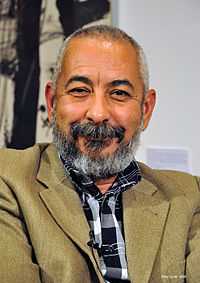Leonardo Padura Fuentes
| Leonardo Padura Fuentes | |
|---|---|
 Leonardo Padura Fuentes | |
| Born |
1955 (age 58–59) Cuba, Havana |
| Nationality | Cuban |
| Movement | Novel, journalism |
| Works | Fiebre de caballos, Adios, Hemingway, El hombre que amaba a los perros |
Leonardo Padura Fuentes (born 1955) is a Cuban novelist and journalist. As of 2007, he is one of Cuba's best known writers internationally. In English and some other languages, he is often referred to by the shorter form of his name, Leonardo Padura. He has written movie scripts, two books of short stories and a series of detective novels translated into 10 languages. In 2012, Fuentes was awarded the National Prize for Literature, Cuba's national literary award and the most important award of its kind. [1]
Life and career
Padura, who was born in Havana, took a degree in Latin American literature at the University of Havana. In 1980 he first came to prominence as an investigative journalist in a literary magazine called Caimán Barbudo, a well-established publication that is still in print today. He subsequently became known as an essayist and a writer of screenplays and in particular, detective novels.
He wrote his first short novel between 1983 and 1984, Fiebre de caballos (Horse Fever), which was basically a love story. He then spent the next six years continuing to work as a journalist, reporting on a wide range of cultural and historical topics. However around this time he began to write his first novel featuring Mario Conde, and while he was writing it, he realised how fundamental his years as a journalist were to his development as a writer. Firstly it gave him a whole new experience of the country, and secondly, it consequently changed his style with respect to his first book.
Padura is best known in the English-speaking world for his quartet of detective novels featuring lieutenant Mario Conde, Las cuatro estaciones (The four seasons). These have recently started to be published in English translation. Mario Conde is a cop who would rather be a writer, and admits to feelings of "solidarity with writers, crazy people, and drunkards". The novels are:
- Pasado perfecto ("Havana Blue", 2007), 1991
- Vientos de cuaresma ("Havana Gold", 2008), 1994
- Máscaras ("Havana Red", 2005), 1997
- Paisaje de otoño ("Havana Black", 2006), 1998.
These books are set respectively in winter, spring, summer and autumn (Vientos de cuaresma literally means "Lenten Winds" and Paisaje de otoño, Autumn landscape). Paisaje de otoño won the 1998 Premio Hammett of the Asociación Internacional de Escritores Policiacos (International Association of Crime Writers); this prize should not be confused with the similarly named Hammett Prize given by the North American branch of the organization, which is restricted to U.S. and Canadian authors. Padura has published two subsequent books featuring Conde, the novella Adiós Hemingway (Padura’s first book to be translated into English, in 2005), and a recent novel La neblina del ayer (The Fog of Yesterday). The Havana-Cultura website comments on the similarities and differences between Padura and Hemingway and how they might explain his decision to feature the expatriate American in Adiós Hemingway.
Padura's books are also available in French (including all the books featuring Conde), Italian, Portuguese, German, Greek and Danish.
Padura's novel El hombre que amaba a los perros (The Man Who Loved Dogs) deals with the murder of Leon Trotsky and the man who assassinated him, Ramon Mercader. At almost 600 pages, it is his most accomplished work and the result of more than five years of meticulous historical research. The novel, published in September 2009, attracted a lot of publicity mainly because of its political theme. The main argument of the author seems to be that Joseph Stalin betrayed socialism and destroyed the hope of creating a utopian society in the 20th century.[citation needed] It leaves open the possibility that such a society might still be possible in the 21st.
Bibliography
- Fiebre de caballos
- Pasado perfecto ("Havana Blue", 2007), 1991
- Vientos de cuaresma ("Havana Gold", 2008), 1994
- Máscaras ("Havana Red", 2005), 1997
- Paisaje de otoño ("Havana Black", 2006), 1998.
- La novela de mi vida, 2002
- Adiós Hemingway, 2005
- La neblina del ayer ("Havana Fever", 2009), 2005
- El hombre que amaba a los perros, 2009 (The Man Who Loved Dogs, 2014)
References
- ↑ Staff writer (December 19, 2012). "Cuba’s National Literature Prize Awarded to Leonardo Padura". Havana Times. Retrieved December 20, 2012.
Further reading
- Uxo, Carlos, ed. (2006). The Detective Fiction of Leonardo Padura Fuentes. Manchester: Manchester Metropolitan University Press. ISBN 1-870355-11-3. Articles in English and Spanish.
- Wilkinson, Stephen (2006). Detective Fiction in Cuban Society and Culture. Oxford & Berne: Peter Lang. ISBN 3-03910-698-8 (US 0-8204-7963-2). This book contains four chapters on Padura and a history of the Cuban detective genre.
- González, Eduardo, (2006). Cuba and the Tempest: Literature and Cinema in the Time of Diaspora. The University of North Carolina Press. ISBN 978-0-8078-3015-4. The long last section of this book is dedicated to Padura's four novels: Las cuatro estaciones, under the title: "1989: The Year that Never Was"
External links
| Wikimedia Commons has media related to Leonardo Padura Fuentes. |
- Interview with Padura in Shots ezine
- Interview with Leonardo Padura on Havana-Cultura
- "Perspectivismo y ficción en La novela de mi vida: la historia como versión de sí misma" Artículo de Sonia Behar en Memoria histórica, Género e Interdisciplinariedad: Los Estudios Culturales Hispánicos en el siglo XXI. Eds. Santiago Juan-Navarro y Joan Torres-Pou. Madrid: Biblioteca Nueva, 2007.